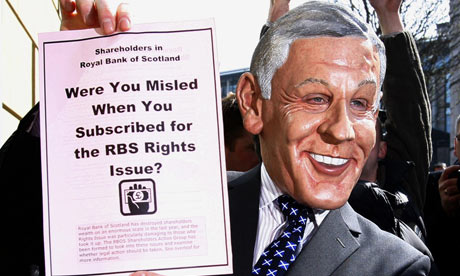Sir Fred Goodwin defies revolt by RBS shareholders
• Ex-chief executive under fresh pressure on pension
• Report on remunerations voted down by big margin
- The Guardian, Saturday 4 April 2009
-
 larger | smaller
larger | smaller - Article history

A protester impersonates Fred Goodwin at the RBS annual meeting in Edinburgh. Photograph: David Moir/Reuters
Sir Fred Goodwin was defiantly refusing to last night hand back any of his £703,000-a-year pension even though Royal Bank of Scotland's shareholders voted decisively against the bank's pay policies at a hostile annual meeting in Edinburgh.
Goodwin was said to be unrepentant even though the chairman, Sir Philip Hampton, made fresh efforts this week to convince the former RBS chief executive to reduce the size of his £16.9m pension pot which was doubled during the October weekend the bank was bailed out by the taxpayer.
As Hampton called for an end to the "public flogging" of RBS bankers, he revealed he had once again phoned Goodwin this week to point out the damage the pension row had caused the reputation of the bank. "I wouldn't want to suggest he's becoming warmer to the idea," Hampton said.
Friends of Goodwin, who is trying to keep a low profile, believe he is determined to hold the bank to the agreement reached on the weekend of 11 October when he was asked to leave. While the remuneration report had been expected to be voted down after UK Financial Investments, the body that looks after taxpayer stakes in banks, made it clear it could not endorse Goodwin's pension, the scale of the rebellion was large.
Barely 10% of shareholders voted in favour of the report and others deliberately abstained, reducing the overall support to 8%. UKFI cast all its shares against the report but big City investors also voted against to throw out the pay policy.
Corporate governance experts Manifest believe the dissent - if deliberate abstentions are included - was the highest ever registered, with a vote in favour of just 8.4%. Turnout was also high at 80% compared with the average turnout of 63% for an AGM of FTSE 100 companies.
But the vote is only advisory and the bank has no ability to stop the payments to Goodwin unless it can find that his contract was not watertight.
At a fractious meeting, private shareholders repeatedly criticised Goodwin's pension and his "regime of fear". One accused him of being a "cataclysmic failure". Another said the bank was a "dead bank on life-support", saying Goodwin was "a benefit scrounger on a massive scale".
Hampton said the bank regarded the row over Goodwin's pension as a distraction and was "leaving no stone unturned" in seeing if there is any way to bring the matter to a close as quickly as possible. He said "As I've said a few times now, whether the contract is watertight is being looked at by more lawyers than you can shake a stick at".
At a packed annual meeting where extra seats needed to be brought in to accommodate the 532 who attended - almost double the number last year - shareholders attacked not just departed boardroom members but also those who remained, including Gordon Pell, promoted to deputy chief executive and finance director Guy Whittaker. One called for them to be "out by tea time". John Waterson, to applause, said they should be "in jail".
Hampton defended them and pointed out nine executives had left the board since the October bail out. He also responded to a shareholder, speaking as a proxy for his wife, who said there had been a "regime of fear" at the bank. Hampton said: "I've heard those stories before. It's clear that Fred Goodwin was a hard driving and decisive character." But he said there was "no room" at RBS for "victimisation and bullying".
Hampton faced some criticism for his role at other companies and of the £1.5m share awards he received on joining the bank earlier this year.
Some investors have also been concerned about the 10.4m shares awarded to Stephen Hester, the new chief executive.
Both executives want to draw a line under the past, particularly after attacks on the bank's branches during G20 protests. "I believe we should bring an end to the public flogging and focus on the good and enduring people and businesses of RBS and allow them to earn our way back to success," Hampton said.
Only a "tiny minority" of the bank's staff were responsible for its record-breaking losses and they had left. Those who remained were not "fat cats or City slickers" but working in branches on less than £21,000 a year.
Thousands of the 180,000 staff are at risk of losing their jobs as the pair scale back the bank after the "utterly disastrous" acquisition of Dutch bank ABN Amro in late 2007 just as the credit crunch began."With the benefit of hindsight, it can now be seen as the wrong price, the wrong way to pay, at the wrong time and the wrong deal," Hampton said.
At last year's AGM Goodwin was faced criticism about over the record breaking £12bn rights issue that just been announced but which was not enough to stop prevent the bank needing a government bail-out in October.
Last night an action group was formed by the Investors Association and Interactive Investor to look at whether shareholders were misled at the time of the rights issue about the financial health of the bank.

No comments:
Post a Comment